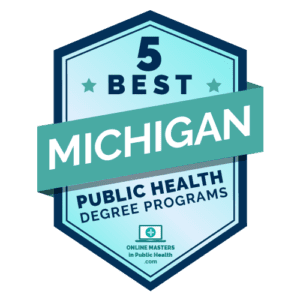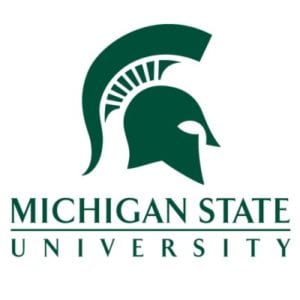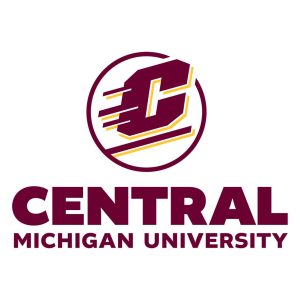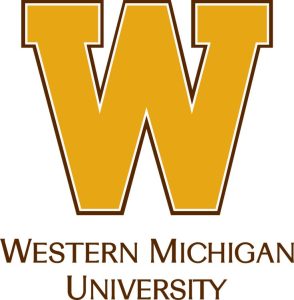MPH Programs in Michigan
 Michigan is the tenth most populated state in the country and the 11th most extensive in land area. Its economy has been deeply wounded by a loss of manufacturing work, which has opened up investments to some degree. However, there has been somewhat of a resurgence in auto manufacturing, and the state’s economy is also known for its forestry, agriculture, services, and high-tech industry. Its most recent unemployment rates came in at 4.3%, and it had the 17th largest gross state product in 2017. Michigan is home to 17 Fortune 500 companies.
Michigan is the tenth most populated state in the country and the 11th most extensive in land area. Its economy has been deeply wounded by a loss of manufacturing work, which has opened up investments to some degree. However, there has been somewhat of a resurgence in auto manufacturing, and the state’s economy is also known for its forestry, agriculture, services, and high-tech industry. Its most recent unemployment rates came in at 4.3%, and it had the 17th largest gross state product in 2017. Michigan is home to 17 Fortune 500 companies.
Those looking to capitalize on Michigan’s fallen stock have helped exacerbate longtime issues of income inequality, discrimination, drug use, and an assault on public utilities, most famously demonstrated in the Flint water crisis. Major public health problems in Michigan include:
- Tobacco use
- Chronic Illness
- HIV
- Lack of public funding
- Lack of insurance and/or access to care
- Obesity
Michigan desperately needs public health professionals, and its education system has begun to reflect that need. On this ranking, you’ll find programs that specifically target the Flint water crisis and how environmental policy shapes water and air quality. You’ll also find a plethora of classes designed to help you combat Michigan’s other serious public health issues.
Earning your degree in public health from a Michigan school doesn’t confine you to working in Michigan, but it certainly would help you get a job in the area. You could work in:
- Advocating for better care and higher standards.
- In environmental health.
- Leading campaigns to curb obesity, smoking, and infant mortality.
- Doing research on the public health problems that impact Michigan.
- Since public health problems let you specialize in areas important to you, you can focus on what you’re passionate about in the field.
On this list we’ve ranked five of the best master of public health programs in Michigan using the following methodology:
Methodology
In building the ranking for The 5 Best Public Health Degree Programs in Michigan, we here at OnlineMastersinPublicHealth looked through all of the MPH programs available in the state of Michigan. Programs may be available online, hybrid, or on-campus. These were then examined and evaluated considering the schools which offered them. We then followed a standard methodology which is explained below.

1) University of Michigan – Ann Arbor, Michigan
 Michigan is a highly ranked public, research university in Ann Arbor, Michigan. It was founded in 1817 and currently serves over 50,000 students while providing a 12:1 student to faculty ratio. Michigan is known as a leading research university in the country and has produced 25 Nobel Prize winners, 6 Turing Award winners and 1 Fields Medalist. The school offers more than 200 undergraduate majors, 100 doctoral programs, and 90 master’s programs. Its Michigan Wolverines offer 27 varsity sports competing in NCAA Division 1. Its notable alumni include U.S. president Gerald Ford, 26 Rhodes scholars, and a plethora of playwrights (Arthur Miller), U.S. legislators (Dick Gephardt), and billionaire CEOs (Google’s Larry Page), among its nearly 500,000 living alumni.
Michigan is a highly ranked public, research university in Ann Arbor, Michigan. It was founded in 1817 and currently serves over 50,000 students while providing a 12:1 student to faculty ratio. Michigan is known as a leading research university in the country and has produced 25 Nobel Prize winners, 6 Turing Award winners and 1 Fields Medalist. The school offers more than 200 undergraduate majors, 100 doctoral programs, and 90 master’s programs. Its Michigan Wolverines offer 27 varsity sports competing in NCAA Division 1. Its notable alumni include U.S. president Gerald Ford, 26 Rhodes scholars, and a plethora of playwrights (Arthur Miller), U.S. legislators (Dick Gephardt), and billionaire CEOs (Google’s Larry Page), among its nearly 500,000 living alumni.
The School of Public Health offers a wide variety of public health degrees including:
- five graduate degrees
- a joint degree informatics degree with the School of Information
- several dual degree programs
- two undergraduate degrees
The University of Michigan masters in public health degree programs are focused on eight areas of study including:
- Biostatistics
- Environmental Health Sciences
- Epidemiology
- Health Behavior and Health Education
- Health Management and Policy
- Nutritional Sciences
- Population and Health Sciences
Michigan offers on-campus MPH’s that can be customized to student’s interests. They also offer an online Master of Public Health with a concentration in Population and Health Sciences. Students can complete their Master of Public Health in two years of study.
2) Michigan State University
 MSU is a public research university in East Lansing, Michigan. It was founded in 1855. It often ranks among the top 30 public universities in the country and the top 100 research universities globally. Over 49,000 students attend MSU, which offers a 16:1 student to faculty ratio. In total, it offers more than 200 academic programs through 17 colleges. Its Michigan State Spartans compete in the NCAA Division 1 in 12 varsity sports for men and 13 for women. Its notable alumni include billionaire Dan Gilbert, actor James Caan, Magic Johnson, and many others. In total there are well over half a million living alumni of MSU.
MSU is a public research university in East Lansing, Michigan. It was founded in 1855. It often ranks among the top 30 public universities in the country and the top 100 research universities globally. Over 49,000 students attend MSU, which offers a 16:1 student to faculty ratio. In total, it offers more than 200 academic programs through 17 colleges. Its Michigan State Spartans compete in the NCAA Division 1 in 12 varsity sports for men and 13 for women. Its notable alumni include billionaire Dan Gilbert, actor James Caan, Magic Johnson, and many others. In total there are well over half a million living alumni of MSU.
The Michigan State public health master’s program was designed with working professionals in mind. All required courses and advising are offered online. The program requires 43 credits and meets all standards of MPH Foundational Knowledge and Competencies set by the Council on Education for Public Health. It can be taken on a part-time or full-time basis (students can complete the program in under two years, or in up to six). The program is broken down into:
- ten credits of foundational courses
- 15 credits of core courses
- 12 credits of elective courses
- six credits in culminating experience courses
Students specialize through choosing electives in areas like:
- Public Health Policy and Administration
- Global and Cultural Public Health
- Epidemiology/Biostatistics/Surveillance
- Infections Disease and Public Health
- Public Health Nutrition
Their culminating experience will come through an applied practice experience or an integrative learning experience.
3) Central Michigan University
 Central Michigan University is a four-year, public university in Mount Pleasant, Michigan. It was founded in 1892 as the Central Michigan Normal School and Business Institute. Over 15,000 students attend the school, which has a 17:1 student to faculty ratio. CMU has nearly 300 undergraduate and graduate programs. Notable alumni include Jeff Daniels and Tim Allen.
Central Michigan University is a four-year, public university in Mount Pleasant, Michigan. It was founded in 1892 as the Central Michigan Normal School and Business Institute. Over 15,000 students attend the school, which has a 17:1 student to faculty ratio. CMU has nearly 300 undergraduate and graduate programs. Notable alumni include Jeff Daniels and Tim Allen.
CMU offers one of the top MPH programs in Michigan. Students can complete their public health degree online or on-campus. CMU offers one of the only MPH programs in the country focused on rural health and underserved communities. a CEPH accredited MPH Bachelor’s in Public Health. Undergraduate students planning to pursue their MPH at CMU can take advantage of the accelerated program. Students can complete their bachelor’s and Master of Public Health in just five years. Required courses include:
- Program Planning and Evaluation
- Public Health Leadership
- Rural Health
CMU also offers a dual degree with their Doctor of Medicine and Master of Public Health. This unique program provides future medical practitioners with knowledge and skills in public health.
4) Grand Valley State University
 Grand Valley is a public liberal arts university in Allendale, Michigan. It was founded in 1960. Grand Valley offers students programs in more than 200 areas of study, with 82 undergraduate majors and 36 graduate programs that include 74 graduate emphases and certificate programs. Over 22,000 students attend GVSU, which has a 15:1 student to faculty ratio. GVSU’s Lakers play in NCAA Division II sports and compete in all 19 intercollegiate varsity sports. The school’s notable alumni include a number of professional football players and Michigan legislators.
Grand Valley is a public liberal arts university in Allendale, Michigan. It was founded in 1960. Grand Valley offers students programs in more than 200 areas of study, with 82 undergraduate majors and 36 graduate programs that include 74 graduate emphases and certificate programs. Over 22,000 students attend GVSU, which has a 15:1 student to faculty ratio. GVSU’s Lakers play in NCAA Division II sports and compete in all 19 intercollegiate varsity sports. The school’s notable alumni include a number of professional football players and Michigan legislators.
Grand Valley offers one of the most flexible masters programs in Michigan focused on public health. Their Master of Public Health comes in an online or hybrid format, offering greater flexibility. GVSU’s MPH is focused on social justice action and research that helps promote public health and deter widespread health problems. Students can choose from two emphasis areas including Epidemiology and Health Promotion. Core courses include:
- Public Health Epidemiology
- Environmental and Occupational Health
- Social and Behavioral Public Health
After completing the 48-credit hour program, students can earn voluntary professional certification by passing the National Board of Public Health Examiners Certified in Public Health (CPH) Exam.
5) Western Michigan University – Kalamazoo, Michigan
 Western Michigan University is a public research university founded in 1903. It is one of eight research universities in the state and offers over 250 degree programs. Approximately 18,266 students attend Andrews, which offers a 16:1 student-to-faculty ratio. WMU is accredited by the Higher Learning Commission.
Western Michigan University is a public research university founded in 1903. It is one of eight research universities in the state and offers over 250 degree programs. Approximately 18,266 students attend Andrews, which offers a 16:1 student-to-faculty ratio. WMU is accredited by the Higher Learning Commission.
WMU offers one of the most innovative Michigan MPH programs. Students can complete their public health program following the HyFlex of fully online format. The HyFlex option is a great choice for students who want the flexibility to meet on-campus for two weekend meetings each month. Students complete the rest of their coursework online in an asynchronous format. Fully online students also complete coursework asynchronously but participate in two required weekend meetings each semester with an online instructor synchronously.
Diverse course offerings prepare students for a variety of roles in public health. Courses cover areas like:
- program planning
- data analysis
- health communication
- research methods
Students can complete this Master of Public Health program in just 28 months. Graduates are prepared for exciting job opportunities that include:
- Public Health Management Analyst
- Director of Programs and Services
- Environmental Health Intelligence Analyst
- Community Health Manager